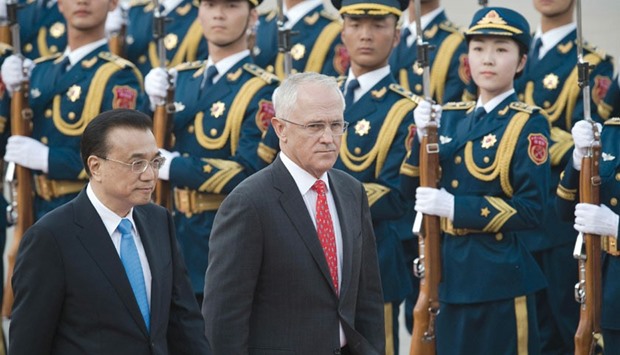
Australian Prime Minister Malcolm Turnbull reviews a military honour guard with Chinese Premier Li Keqiang during a welcoming ceremony in Beijing.
Australia is granting 10-year visas to some Chinese nationals, its prime minister said yesterday, seeking to boost visits to a country that already attracted more than 1mn Chinese tourists last year.
Australia will for the first time offer visa applications in Chinese and online, Malcolm Turnbull said as he kicked off a visit to China which publically avoided divisive issues such as the South China Sea and human rights.
“We’re also trialling 10-year validity visas, again for the first time, here in China,” Turnbull said in the commercial hub of Shanghai, without specifying what kinds of traveller could apply.
There was no indication that the concession was reciprocal.
Australia is one of the few developed economies to run a trade surplus with China, thanks to exports of raw materials such as iron ore on a gigantic scale, but it is seeking to diversify its resources-weighted economy in the face of falling commodities prices.
Turnbull met with Chinese Premier Li Keqiang later in Beijing where they watched representatives of Rio Tinto and Sinosteel sign an agreement to extend their mining joint venture.
The agreement comes even as China faces intense criticism from European steelmakers who accuse it of dumping surplus capacity on world markets.
Australia valued its bilateral trade with China at Aus$150bn ($115bn) last year, and the two nations in December put into effect a free trade agreement to open markets further.
According to Chinese Customs figures, Australia had a trade surplus of around $33bn with China in 2015.
Despite Australia’s financial dependence on the world’s second-largest economy, it remains a staunch political ally of the US in the Asia-Pacific.
Washington is reportedly in talks to station strike bombers in Australia, a US general said in March, amid concerns about Beijing’s moves in the disputed South China Sea.
Turnbull made little mention of divisive political issues in his public remarks in Shanghai though he mentioned China’s “long journey” towards the rule of law. The prime minister - who was accompanied by a giant business delegation - praised China’s economic development but acknowledged the impact of its slowing growth.
“We have to work harder, much harder, to strengthen and expand these business links, as our economies continue to transition,” Turnbull said in speech at a business event.
“I’m here to help Australian exporters open doors which had been locked,” he said, adding his government was watching the implementation of recently announced regulations regarding tax on cross-border e-commerce transactions.
Reports said the rules could see Australian shipments of products including lucrative dairy and vitamin exports turned back at China’s border.
